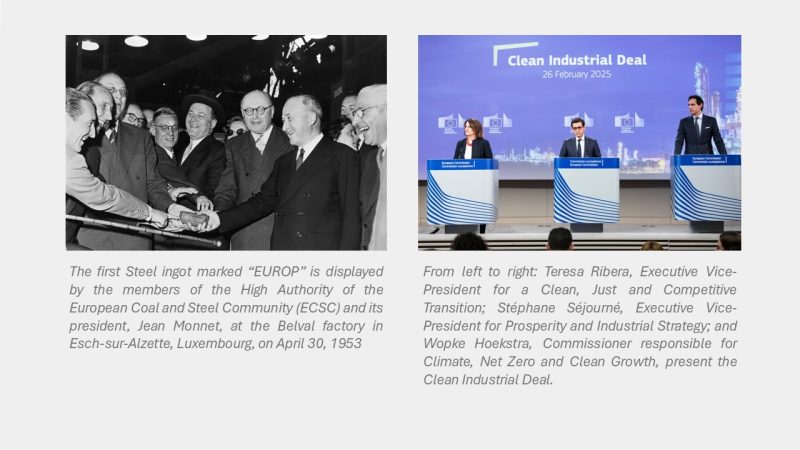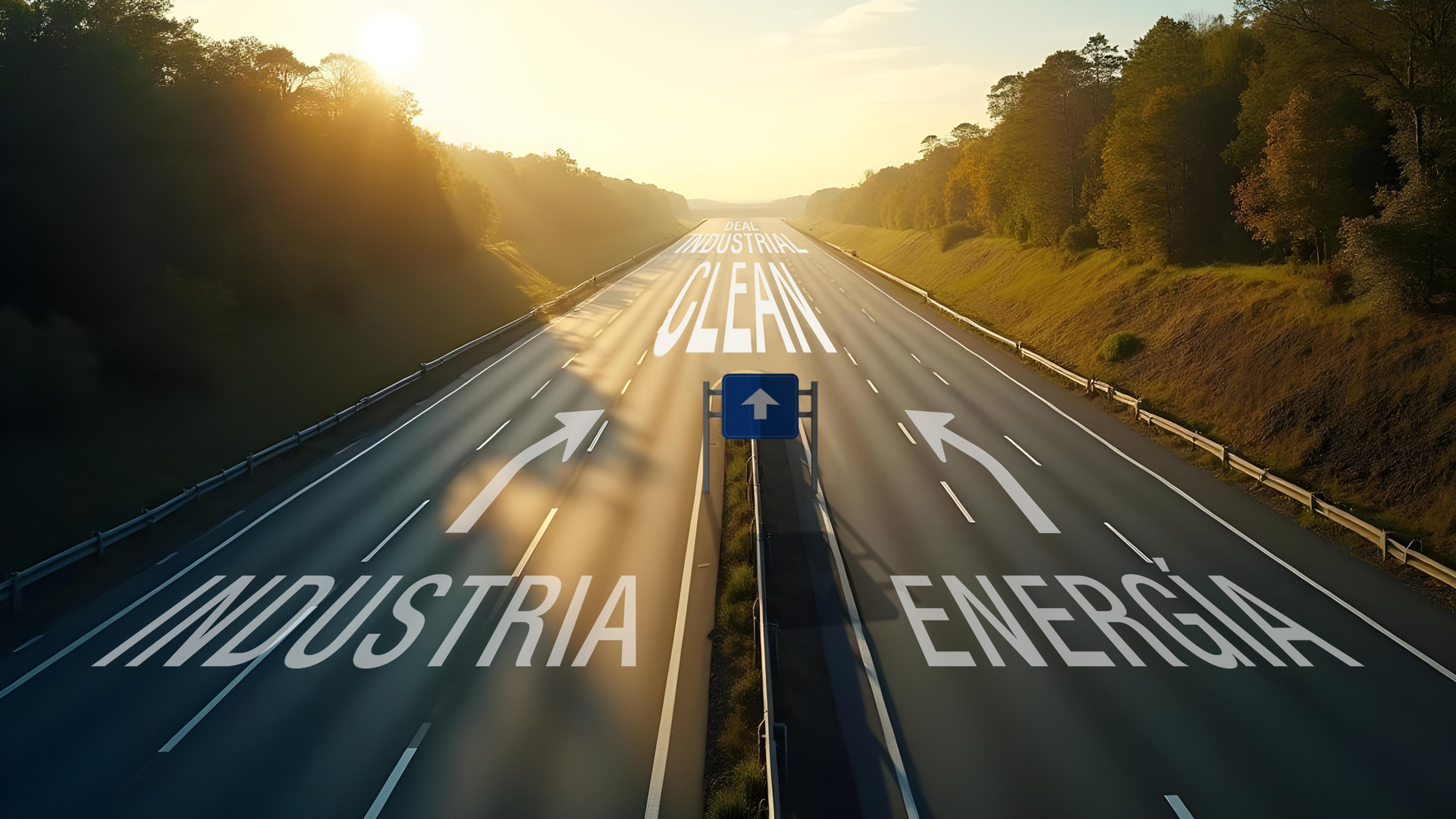Towards the European Community of Clean Energy and Industry
-
The European Commissioner for Climate, Net Zero, and Green Growth, Wopke Hoekstra, proposes reindustrializing “the European way.”
-
The European Community resulting from the Clean Industrial Deal could well be called the “European Community of Clean Energy and Industry,” a tool for competing with other economies.
-
The Clean Industrial Deal is not just about producing more clean energy; it’s about building a smart, interconnected, and resilient energy system that not only reduces emissions but also guarantees affordable prices and a stable supply for industry.
-
The Clean Industrial Deal doesn’t forget the “human factor,” a topic that will be addressed at our upcoming Foro Sella Aragón: “The transformation of our industry requires qualified people and quality jobs,” as emphasized by Vice President Teresa Ribera.
Since its founding in 2021, Foro Industria y Energía has championed an issue that, although obvious, seemed to be overlooked by much of the public opinion: industry and energy are two sides of the same coin, indivisible realities that must progress hand in hand. Today, we can say that what started as a solitary call in 2021 has become the cornerstone of the new European strategy.
The announcement of the Clean Industrial Deal represents much more than a new policy: for us, it is the crystallization of a vision we have been advocating for years. Europe has finally understood that industry and energy form an inseparable duo, thus returning to the origins of the European Union: that initiative under the name of the European Coal and Steel Community (ECSC) born from the symbiosis between the predominant energy of the time (coal) and basic industry (steel). The European Community resulting from the Clean Industrial Deal could very well be called the “European Community of Clean Energy and Industry” as a tool to compete with other economies.

Europe has understood that there can be no energy transition without a strong industry, nor a competitive industry without affordable, secure, and sustainable energy. The definitive reconciliation of industrial and energy policies is not only an economic necessity but the only way to ensure Europe’s geopolitical relevance in an increasingly complex world.
Competing Through Decarbonization, Not Despite It: The New European Industrial Paradigm
For years, European industry has been asked to decarbonize, to adapt to environmental demands, but without the necessary tools to do so without losing competitiveness. The result: offshoring, loss of production capacity, and growing dependency on imports with a higher carbon footprint.
The Clean Industrial Deal marks a paradigm shift. Decarbonization is no longer seen as an obligation that risks the viability of industry, but as an opportunity to reindustrialize Europe and regain strategic autonomy.
Von der Leyen Delivers: 100 Days Turn Into 88
European Commission President Ursula von der Leyen promised at the start of her mandate to deliver a Clean Industrial Deal within the first 100 days. Today, we look with satisfaction as the plan was announced on day 88, a clear signal of the priority this vision holds for Europe’s future.
This urgency is no small matter. In an increasingly turbulent global scenario, with rising geopolitical tensions between powers like the U.S. and Russia, Europe has decided to take control of its industrial and energy destiny.
From Spectators to Protagonists: Europe Stops Reacting and Starts Leading
Last week, we analyzed the possible consequences of the negotiations between the U.S. and Russia, raising the risk of some countries halting the energy transition, creating internal divisions.
This week, the message from European Commissioner for Climate, Net Zero, and Green Growth Wopke Hoekstra clears up any doubts: “The path ahead of us is clear. We will reindustrialize our economy, and we will do it the European way.”
This change in course marks a fundamental shift: Europe wants to stop being a mere reactor to the moves of Washington or Moscow. We are finally witnessing the birth of what we could call a “Europe First,” a proactive strategy to shape our own industrial and energy future.
The Clean Industrial Deal is not just a response to the aggressive industrial policies of other powers, like the U.S. Inflation Reduction Act. It is the affirmation of a unique path, a “European way” for green reindustrialization.
From Exodus to Rootedness: Europe Extends a Hand to Its Energy-Intensive Industry
One of the most significant aspects of the Clean Industrial Deal is its explicit support for energy-intensive industries. For too long, these industries have been seen as a problem to solve in the context of decarbonization, without being given the necessary tools to adapt.
The new approach sends a clear message in favor of reshoring or industrial relocation. As Commissioner Hoekstra has emphasized: “We need to ensure that these companies stay and succeed in the European Union.” And he adds with conviction: “In our view, this gives us a clear signal that we are doing business.”
The new agreement not only recognizes that these industries can and must decarbonize, but it also focuses on providing them with the regulatory framework and incentives necessary to do so without losing competitiveness. It is no coincidence that this milestone coincides with the presentation of the Action Plan for Affordable Energy, reinforcing the central role of the industry-energy duo in the continent’s competitiveness.
Electrification, Networks, and Storage: The Backbone of the Energy Transition
The Clean Industrial Deal recognizes that without robust and flexible electrical infrastructure, the energy transition will remain mere rhetoric. Therefore, it pays special attention to electrical grids, electrification, and storage, which are essential to ensure a stable and affordable supply.
The document emphasizes the need to accelerate the electrification of the European economy. Currently, the electrification rate in the EU is around 21.3%, but the goal is to reach 32% by 2030. This implies not only increasing renewable electricity generation but also modernizing the grids to integrate these intermittent sources.
The European Grid Package will simplify procedures for interconnection projects, while the digitization of grids with artificial intelligence will optimize real-time management. To combat price volatility, the Deal proposes a reform of the electricity market with greater use of PPAs and Contracts for Difference, offering long-term stability to industry.
Storage also plays a central role in the strategy. The document notes that, to ensure continuous supply, it is crucial to accelerate the deployment of energy storage systems, both large-scale (like batteries and pumped hydro storage) and distributed. This will not only help balance the grid but also allow for maximum use of renewable energy generated during low-demand hours.
In summary, the Clean Industrial Deal is not just about producing more clean energy but about building a smart, interconnected, and resilient energy system. A system that not only reduces emissions but also guarantees affordable prices and a stable supply for industry and European households.
The Architects of the Transition: The Human Capital Behind the New Industry
A frequently overlooked aspect of discussions on the energy transition is the human factor. As Teresa Ribera pointed out in her speech presenting the Deal: “The transformation of our industry requires qualified people and quality jobs. These will be the foundation of an inclusive and equitable green transition. The shift to clean energy is already creating jobs.”
The First Vice President of the European Commission for Clean, Just, and Competitive Transition highlights a revealing fact: “By 2030, just the EU’s renewable energy targets will generate more than 3.5 million new jobs” in the renewable sector, offering a promising future for workers and SMEs.
This transformation is not just a matter of technologies but, fundamentally, of people and properly trained professionals. Without them, the energy transition would become an unreachable dream, and Europe’s strategic autonomy would be in jeopardy. This often-relegated factor will be one of the key topics addressed at Foro Sella 2025.

